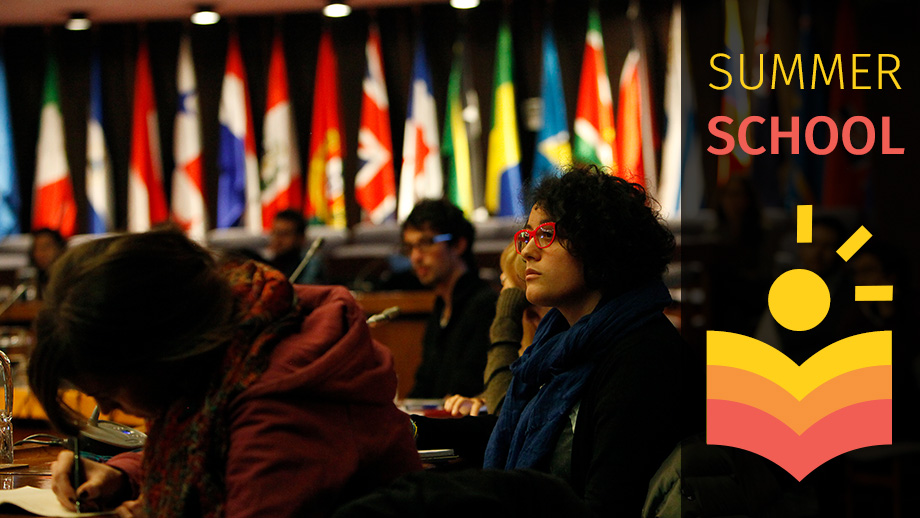Summer school on Latin American economies
The Summer School on Latin American Economies of the Economic Commission for Latin America and the Caribbean is a plural space of thought that promotes discussion, reflection, and the generation and exchange of ideas on policies in favor of growth and for combating poverty and inequalities. It combines the specialized contributions of the different divisions of ECLAC and the advances in the frontier of academic research.
In 2000, with the motivation and interest to share and promote with students and researchers from all over the world the work it carries out, the division of Production, productivity and management, joining forces with ECLAC as a whole, hosted the first edition of the Summer School. Since then, more than 500 students from 35 countries and different Universities around the world have joined the Summer School. ECLAC has consolidated an analytical tradition that gives a major role to the dynamics of the productive structure, technology and the pattern of specialization in long-term growth. His contributions today are part of a rich tradition in economic theory, combining the Keynesian emphasis on effective demand, income distribution and full employment policies, with the Schumpeterian and evolutionist tradition, which analyzes the dynamics of learning, Innovation and diffusion of technology, and their impact on productive patterns. It recognizes that industrial and technological policies are a key condition for achieving the convergence of developing countries with advanced countries, both in terms of per capita income and technological capacities.
The Summer School is an opportunity to discuss these issues with depth and rigor, while respecting the pluralism inherent in the social sciences. The program addresses theoretical and empirical issues, emphasizing the region's recent economic history, and how it conditions perspectives and policies into the future.
The classes are taught by ECLAC staff and also by distinguished professors (economists and social scientists) invited every year. Among those who have already participated are the professors Luis Bértola, from the University of the Republic of Uruguay; Robert Blecker, of the American University of the United States; Giovanni Dosi, of the Sant'Anna School, University of Pisa, Italy; José Antonio Ocampo, of Columbia University, United States; Tommaso Ciarli, University of Sussex, England, among others.
Course information
- Ideal candidates are young researchers interested in studying the Latin American development process.
- The Summer School takes place every year between July and September.
- The program is organized in different thematic modules, covering the main areas of knowledge of ECLAC, ranging from macroeconomics to microeconomics, industrial organization, innovation economics and Latin American economic history. It also includes thematic areas such as growth and development, trade and integration, social policies, income distribution, gender, human rights and sustainable development, among other topics of interest and study. Classes are in Spanish and English, and full dedication is required throughout the program.
- The registration, tuition and enrollment of the course are free and exempt from payment by the participants, who are responsible for their travel, accommodation and accommodation costs.
- To obtain the certificate of the course, the participants have to submit a work of about 10,000 words on a topic covered during the Summer School. Participants enrolled in post-graduate or doctoral courses may direct their efforts to develop research that contributes to their dissertation or thesis.
Application process and requirements
1. Requirements: Advanced university degree in economics, economic development or related areas; Fluency in English and Spanish. We encourage the applications of students who are pursuing a postgraduate or doctorate in the field of economic development.
2. Applicants must complete the online application form and send the following documents: one reference letters from supervisors or people familiar with their academic background; and a letter of motivation describing their interest in participating in the Summer School.
Find out everything about the Summer School at facebook.com/summerschoolCEPAL
Related link(s)
Related content
28 estudiantes de 12 países participarán en la 21ª versión de la Escuela sobre Economías Latinoamericanas de la CEPAL
Más de 200 jóvenes de 30 países postularon al programa de formación para alumnos de postgrado, que se desarrollará entre los meses de enero y marzo de 2021 en Santiago de Chile.
Escuela de verano sobre economías latinoamericanas 2018
La Escuela de Verano sobre Economías Latinoamericanas de CEPAL es un espacio plural de pensamiento que promueve la discusión, la reflexión, y la generación e intercambio de ideas sobre los problemas…

Escuela de Verano de la CEPAL sobre Economías Latinoamericanas 2017
La Escuela de Verano de la CEPAL, creada en el 2000, es un espacio plural de pensamiento que promueve la discusión, la reflexión, y la generación e intercambio de ideas sobre los problemas…

